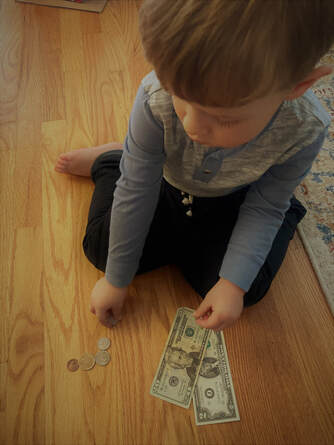 When do kids/grandkids understand money? Ask them 'what is money used for?' If children respond with ‘to buy things’ then they can begin to understand the use of money. Money is used for an exchange of goods. Children might first encounter this exchange when playing a video game. Virtual rewards can be used to buy pets, furniture, clothing, etc. Video games help explain earning and spending. It is important to explain the difference between virtual money and real money. 1. How to make money real for kids/grandkids? Begin with actual dollars and coins. Real money is tangible and easier to show and explain before teaching digital currency. Start with the basics by including counting and sorting coins and dollars into your gameplay. Then advance to labeling toys, clothing, or food in your pantry with price tags and play ‘store’ by purchasing these items you own. Finally, practice making and counting out the correct amount of change. What a fun game and important life skill you will be teaching your children/grandchildren! 2. You can bank on it! Field trip time to the bank, of course! Have your grandchild or child make a deposit of birthday money or an earned allowance into a joint account with you. Next, show them how their dollars and coins became digital money by logging into your online banking portal. Make sure to explain how banks hold physical and virtual money. 3. Field trip! Once your kids/grandkids understand a savings account, show them how to spend some money from a checking account. While it might be disappearing, you can still teach your grandkids how to write a check. Further, another field trip to an ATM machine is also a real world experience demonstrating virtual vs. real money. This outing should also include a lesson on ATM fees, PIN number, and an explanation that this isn’t 'free' money. 4. Start with debit cards. Are your children/grandchildren in their teenage years? This is a good time to start them with their own debit card. Before handing over the card, teach lessons on the difference between a credit card vs. debit card, how to check your expenses and account balance, and how to keep the debit card number and pin confidential. 5. Build smart online consumers. In the world we live in of online and other media advertising, it is imperative to make your children/grandchildren savvy consumers. Teens should research their wants, shop sales, read reviews, and hold off on impulse buying. A 2 week ‘pause’ on spending money on an expensive item is an option to avoid impulse buying. At the end of the 2 weeks if the teen still really wants to buy the item with their hard-earned money, then that is their spending decision. We live in an exciting new electronic world, but it's our job as parents and grandparents to prepare our next generation for how this new world influences them. It's also important to teach kids and teens to protect themselves from hackers and lurkers. Their private information can be stolen, and they need to learn ways to protect it. More questions? Contact us at [email protected] or 979-694-9100.
2 Comments
9/30/2022 05:58:48 am
What an exquisite article! Your post is beneficial right now. Thank you for sharing this informative one. If you're looking for a money-making app, download this link https://bit.ly/3MSDRA9
Reply
9/30/2022 06:00:19 am
Great article! Thank you for sharing this informative post, and looking forward to the latest one.
Reply
Leave a Reply. |
Archives
July 2024
Categories
All
|
Let our team work for you. Call 979-694-9100 or
email [email protected]
|
TRADITIONS WEALTH ADVISORS
2700 Earl Rudder Frwy South, Ste. 2600 College Station, TX 77845 |
VISIT OUR BLOG: Stay current with industry news and tips.
|


